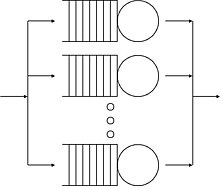Our website is made possible by displaying online advertisements to our visitors.
Please consider supporting us by disabling your ad blocker.
Queueing theory

Queueing theory is the mathematical study of waiting lines, or queues.[1] A queueing model is constructed so that queue lengths and waiting time can be predicted.[1] Queueing theory is generally considered a branch of operations research because the results are often used when making business decisions about the resources needed to provide a service.
Queueing theory has its origins in research by Agner Krarup Erlang, who created models to describe the system of incoming calls at the Copenhagen Telephone Exchange Company.[1] These ideas were seminal to the field of teletraffic engineering and have since seen applications in telecommunications, traffic engineering, computing,[2] project management, and particularly industrial engineering, where they are applied in the design of factories, shops, offices, and hospitals.[3][4]
- ^ a b c Sundarapandian, V. (2009). "7. Queueing Theory". Probability, Statistics and Queueing Theory. PHI Learning. ISBN 978-81-203-3844-9.
- ^ Lawrence W. Dowdy, Virgilio A.F. Almeida, Daniel A. Menasce. "Performance by Design: Computer Capacity Planning by Example". Archived from the original on 2016-05-06. Retrieved 2009-07-08.
- ^ Schlechter, Kira (March 2, 2009). "Hershey Medical Center to open redesigned emergency room". The Patriot-News. Archived from the original on June 29, 2016. Retrieved March 12, 2009.
- ^ Mayhew, Les; Smith, David (December 2006). Using queuing theory to analyse completion times in accident and emergency departments in the light of the Government 4-hour target. Cass Business School. ISBN 978-1-905752-06-5. Archived from the original on September 7, 2021. Retrieved 2008-05-20.
Previous Page Next Page


